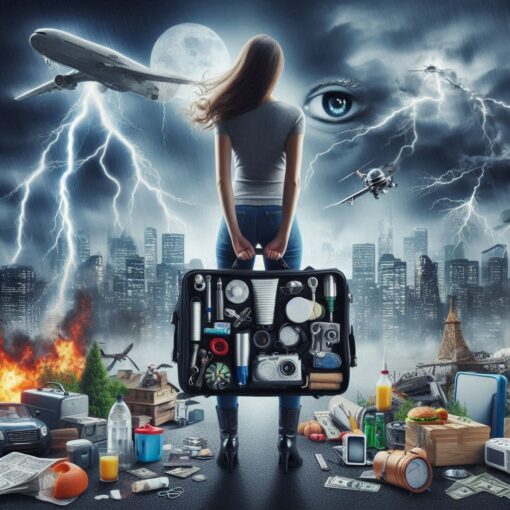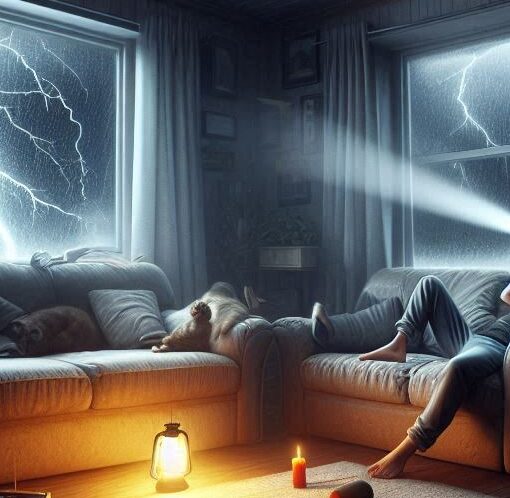Have you ever thought about what you’d do if an emergency struck? Maybe a natural disaster, power outage, or even something as simple as being stranded without your phone charger.
It can feel overwhelming, but fear not! Being prepared doesn’t have to break the bank. Let’s explore some affordable ways to get yourself ready for whatever life throws your way.
Start with a Plan: Your Emergency Blueprint

First things first: having a plan is essential. Think of it like mapping out a road trip—you wouldn’t just hop in the car and hope for the best, right? So grab a pen and paper (or your favorite note-taking app) and jot down key details.
Consider where you’ll go if you need to evacuate. Is there a friend or family member nearby who can take you in? Make sure everyone in your household knows this plan—communication is key! You could even hold a family meeting (yes, those are still a thing) to discuss how each person will contribute during emergencies.
Also, don’t forget about pets! They’re part of the family too. Include them in your plans by deciding how you’ll care for them when things get tough. What supplies do they need? Where will they stay?
Build Your Emergency Kit: Essentials on a Budget

Next up is creating an emergency kit. Now, I know what you’re thinking: “Kits must cost a fortune!” But that’s simply not true! You can build one piece by piece without emptying your wallet.
Start with basics like water and non-perishable food items—think canned goods or granola bars. These don’t have to be gourmet; just make sure they’re something you’d actually eat when hunger strikes!
Then add first-aid supplies—a basic kit doesn’t need fancy bandages or ointments. Grab adhesive bandages, antiseptic wipes, and over-the-counter pain relievers from your local dollar store; they usually have great options at low prices.
Don’t forget tools! A flashlight with extra batteries can be lifesaving during power outages. If you want to go all-out, consider adding multipurpose tools that come with screwdrivers, knives, and more—all compact enough to fit in any bag!
Stay Informed: Knowledge Is Power
Being prepared isn’t just about having stuff—it’s also about knowing what to do when emergencies arise. Luckily, education doesn’t require spending big bucks!
Take advantage of free resources available online or at local community centers. Websites like FEMA (Federal Emergency Management Agency) offer tons of valuable information on preparedness strategies specific to various emergencies.
Consider attending workshops or classes offered by local organizations—they often cover topics such as CPR training or disaster response skills—and many are either free or very inexpensive.
And hey, don’t underestimate the power of social media! Follow reliable accounts that share tips on emergency preparedness; sometimes all it takes is one tweet or post to give you that lightbulb moment!
Get Creative with Community Resources
Speaking of community resources, tap into local networks for support! Many towns have groups focused on emergency preparedness—these can be great places to connect with others who share similar interests while learning new skills together.
You might even find barter systems among neighbors—maybe someone has extra flashlights while another has canned goods they’re willing to trade! It’s all about pooling resources so everyone stays safe without overspending.
Plus, check out thrift stores for budget-friendly gear—people often donate perfectly good items that could come in handy during an emergency situation.
Maintain Your Readiness: Regular Check-Ins
Finally—and this part’s super important—don’t let your hard work go stale! An emergency plan is only effective if it’s kept up-to-date. Set reminders every few months to review your kits and plans; make sure everything’s still functional and relevant.
Check expiration dates on food items and replace anything that’s gone bad—nothing worse than opening up a can of beans only to discover they’ve turned into science experiments!
Revisit communication plans regularly too; people move around more these days than ever before. Update contact information so everyone knows who to reach out to during crises.
By staying proactive rather than reactive, you’re ensuring peace of mind—not just for yourself but also for loved ones around you!
Suggested Resources:
Emergency Preparedness Guide
https://www.ready.gov/prepare
FEMA – Prepare Your Family
https://www.fema.gov/press-release/20211013/fema-prepare-your-family
American Red Cross – Disaster Preparedness
https://www.redcross.org/get-help/how-to-prepare-for-emergencies.html




